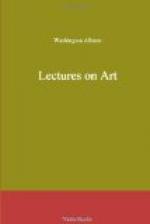From this it would appear, that, while we cannot to ourselves become the object of Harmony, it is nevertheless certain, from the universal desire so to realize it, that we cannot suppress the continual impulse of this paramount Principle; which, therefore, as it seems to us, must have a double purpose; first, by its outward manifestation, which we all recognize, to confirm its reality, and secondly, to convince the mind that its true object is not merely out of, but above, itself,—and only to be found in the Infinite Creator.
Art.
In treating on Art, which, in its highest sense, and more especially in relation to Painting and Sculpture, is the subject proposed for our present examination, the first question that occurs is, In what consists its peculiar character? or rather, What are the characteristics that distinguish it from Nature, which it professes to imitate?
To this we reply, that Art is characterized,—
First, by Originality.
Secondly, by what we shall call Human or Poetic Truth; which is the verifying principle by which we recognize the first.
Thirdly, by Invention; the product of the Imagination, as grounded on the first, and verified by the second. And,
Fourthly, by Unity, the synthesis of all.
As the first step to the right understanding of any discourse is a clear apprehension of the terms used, we add, that by Originality we mean any thing (admitted by the mind as true) which is peculiar to the Author, and which distinguishes his production from that of all others; by Human or Poetic Truth, that which may be said to exist exclusively in and for the mind, and as contradistinguished from the truth of things in the natural or external world; by Invention, any unpractised mode of presenting a subject, whether by the combination of entire objects already known, or by the union and modification of known but fragmentary parts into new and consistent forms; and, lastly, by Unity, such an agreement and interdependence of all the parts, as shall constitute a whole.
It will be our attempt to show, that, by the presence or absence of any one of these characteristics, we shall be able to affirm or deny in respect to the pretension of any object as a work of Art; and also that we shall find within ourselves the corresponding law, or by whatever word we choose to designate it, by which each will be recognized; that is, in the degree proportioned to the developement, or active force, of the law so judging.
Supposing the reader to have gone along with us in what has been said of the Universal, in our Preliminary Discourse, and as assenting to the position, that any faculty, law, or principle, which can be shown to be essential to any one mind, must necessarily be also predicated of every other sound mind, even where the particular faculty or law is so feebly developed as apparently to amount to its absence, in which case it is inferred potentially,—we shall now assume, on the same grounds, that the originating cause, notwithstanding its apparent absence in the majority of men, is an essential reality in the condition of the Human Being; its potential existence in all being of necessity affirmed from its existence in one.




